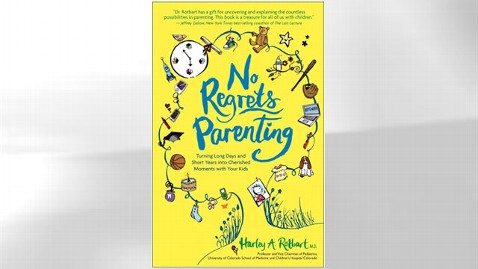'No Regrets Parenting': A Way to Beat the 'Other Biological Clock'

(Harley A. Rotbart)
I am going to go out on a limb here and make the assumption that there isn't a parent on this planet that actually wants to cross the parenting finish line and think to themselves, "Wow, I really messed that up." No one wants that sick feeling of regret sitting heavy in their hearts, when they look back at the years they spent raising their children.
Well I have a potential anecdote for that fear in the form of a new book written by pediatrician, Harley A. Rotbart, titled " No Regrets Parenting." This very digestible parenting book, aims to help parents make the most of the time they actually have with their children, and it appears to be striking a chord with parents. According to Rotbart, Amazon.com sold out of the book within five days of its release on Feb. 21, and had to order more copies. Brick and mortar Barnes and Noble stores around the country were selling out, and it was number the number two parenting book in the country (after the much talked about " Bringing Up Bebe").
The introduction of "No Regrets Parenting," touches on the sheer exhaustion parenting can inflict. Rotbart writes, "You have just enough energy left to drag yourself to bed so you can wake early and start the grind all over again. Each day with young kids feels like a week, each week like a month." But then he reminds the reader how quickly it all flies by, "The colorful mobiles hanging from their cribs morph into tricycles, which morph into driving permits. And then poof. They are gone. Sunrise. Sunset."
Rotbart points out that there is another "biological clock" parents are trying to beat - the one that turns babies into adults in what feels like a blink of an eye. He notes there are only 940 Saturdays between a child's birth and when she leaves for college, and his book aims to make the most of those Saturdays, and all of the other small and large moments parents have with their children. With "No Regrets Parenting," Rotbart aspires to help parents get to the major milestones in their kids' lives without regret, by "turning long days and short years into cherished moments with your kids."
In our telephone conversation, Rotbart explained that he was motivated to write the book by 30 years of practicing pediatrics and seeing some good, and some not so good parents, as well as watching friends raise their own kids - a number of whom he says wish they could do it over again. His perspective is not only observational, it's personal as well. He and his wife have three children - ages 24, 22 and 19.
We discussed the guilt that many parents are plagued by - both those who stay at home and those who work outside of the house. According to Rotbart, there can be a significant amount of guilt with each family dynamic, and that guilt can rob parents of opportunities to be completely present and engaged when they are actually with their children.
"'No Regrets Parenting' does not ask parents to give up their professional accomplishments, personal achievements or the financial stability of their family. Parents must feel no guilt about the missed opportunities with their kids, as long as they make the most of the realized opportunities with their kids," he said.
The tone and approach of Rotbart's book puts the control back in the parent's hands, by focusing on the time a parent does have with children, instead of focusing on the time that the parent doesn't have. His conversational tone helps put the parent at ease in what feels like a knowledgeable friend sharing their own insight.
He explains that he deliberately chose to not to embrace a parenting "fad du jour" and went on to explain that "the common denominator of all parenting styles is the need for time with your kids. So if I can help parents find more and better time with their kids - I trust them to figure out how to use it."
In the book, Rotbart gives concrete examples of ways to realize those opportunities with your children, explaining the benefits of changing the perspectives on the daily obligations such as giving baths and making dinner, and seeing them instead as privileges, pointing out, "You're there anyway - do it in a way that makes it mean something."
He also explains how taking the time to listen to your children and to be present, really present, when you are with them in the early years, lays the groundwork for a relationship of trust in the later years. "When you are making the time for the crisis of the moment at 3, 5, and 7, you are telling them you will there for the big things."
During our conversation, we discussed our own children and our common desire to, above all else, do right by them. Instead of over-thinking how parents can help their kids grow into amazing adults, Rotbart offered up a simple piece of advice, "You should be the kind of person you want your kids to be." That's a basic principal that has the potential to change your life, and your child's.